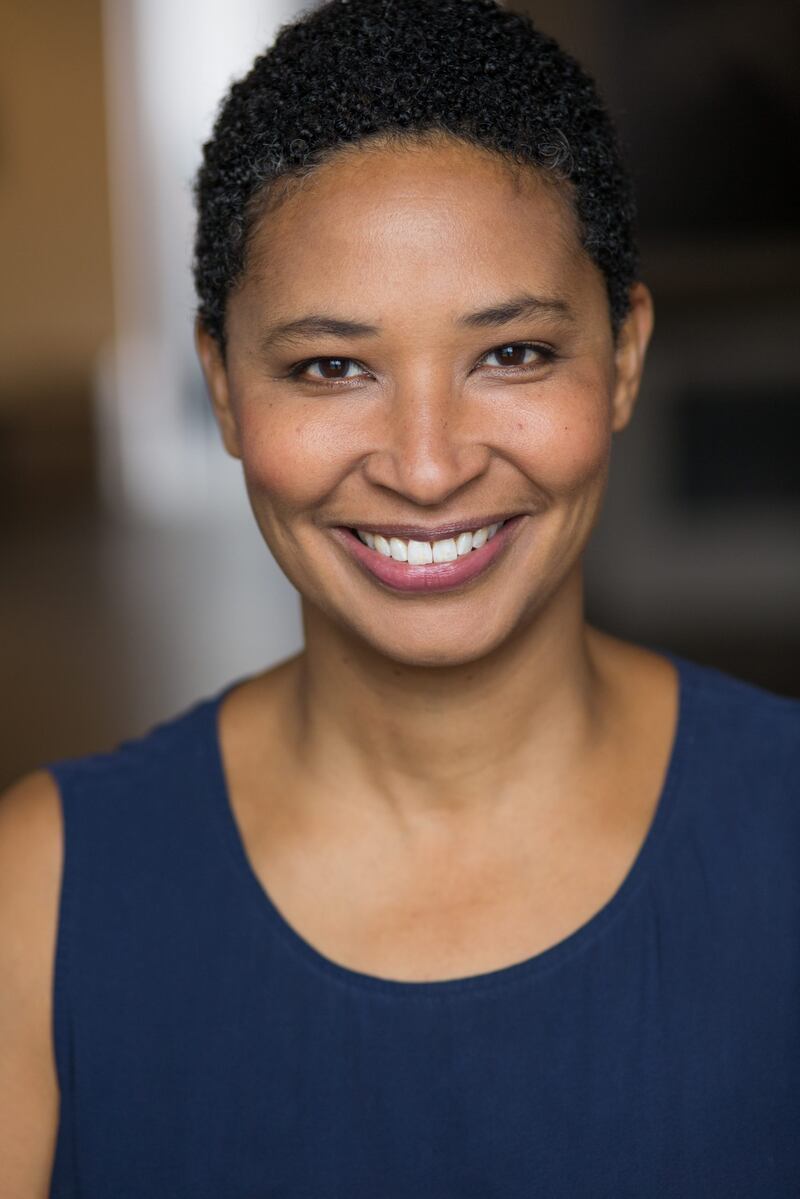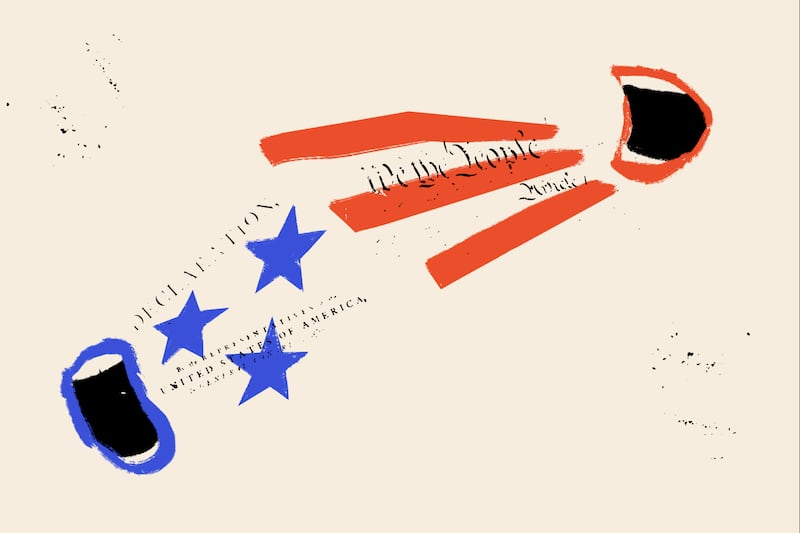As we prepare to celebrate the signing of the Declaration of Independence on July 4 and begin thinking about the upcoming 250th anniversary of that event, I am thinking about a conversation I had with the remarkable Danielle Allen. She is the first Black female university professor in the history of Harvard University, the author of many books, including “Our Declaration: A Reading of the Declaration of Independence in Defense of Equality,” and a public intellectual with expertise on pluralism and democratic reform.
“Democracy is the best political form for securing empowerment for people,” says Allen, who is also director of the Allen Lab for Democracy Renovation at Harvard Kennedy School’s Ash Center for Democratic Governance and Innovation.
I was curious about what that means, theoretically and practically, and especially with regard to bridging the stark divides that exist in American democracy today. Before we bridge divides, we must understand our end game, what we’re building a bridge to, but are we too late to fix things?
Allen digs into the questions of how to renovate a democracy in her book “Talking to Strangers: Anxieties of Citizenship since Brown v. Board of Education.” On the Interfaith America podcast, we dug into what pluralism, democracy and bridge-building look like in America today — and what our democracy could look like in the year 2050.
This excerpt of our conversation has been edited for clarity and length.
Eboo Patel: You are doing a range of things — writing a book, chairing a commission, considering a run for political office, and making million-dollar foundation decisions. What is the Danielle Allen project?
Danielle Allen: You list all those things, and it reminds me of my mother telling me, “Danielle, you need to focus.” I keep saying to people, “Well, I do focus. My focus is democracy.”
The challenge is that democracy is a holistic field of endeavor. I think recognizing that is really important to securing the health of democracy. It’s a long, long story and sort of a family tradition in the democracy work, and it became live for me as I watched my own generation come up in the world. I grew up in a super civically engaged family. Folks were engaged on both sides of the aisle.
Our generation has lived through the “great pulling apart.” I am fortunate to talk with you from Harvard University, sitting in my office. It’s an incredible position of privilege; I feel that every day. I have a brother who is a corporate executive, but at the same time, I have cousins who aren’t with us anymore. Losing my youngest cousin, Michael, in 2009 was a real turning point moment for me where I was like, “Democracy is not just supposed to be abstractly valuable. It is supposed to be a way of living together that makes it possible for every generation to come up together and rise up together. What’s going on here?” Then I realized what happened in my family had happened in the whole country.

The whole country over my lifetime has experienced that pulling apart with the huge rise of income inequality, wealth inequality, polarization and incarceration. I started asking the question, how can we change the dynamic? How can we have a democracy that helps us pull together so that every cohort can come forward?
EP: If the project is successful, what are some features of American life and democracy in the year 2050?
DA: Thirty years gives me a good long runway to consider. I said the project was about democracy, and to be more specific, the project is a democracy renovation. I believe that democracy is necessary for human flourishing and well-being. This is because I think that empowerment is the key ingredient for the healthy, flourishing life of any individual family or community. Democracy is the best political form for securing empowerment for people.
We have been fortunate in this country to have a constitutional democracy of a kind operating for some time, but there are lots of ways in which it’s not working. For starters, in the 21st century, we face all kinds of stresses from being a scaled-up, huge society, incredibly complex, heterogeneous, technologically enabled, and the like. Our 18th-century institutions are straining under that.
Then there’s the second fact that these institutions we share — I think of it as a shared house we live in — were never built for everybody in the first place. The original design gave some folks beautiful rooms with a view. Others were stuck in dark, dangerous, torturous basements. We have a project of redesign. That’s why I use the vocabulary of renovation, and the goal is to find our way to the form of democracy in the 21st century that supports the empowerment of all.
EP: The other person who famously used the house metaphor recently is Isabel Wilkerson. In the book “Caste,” she says you cannot renovate a house that is rotten to its foundations. One of the ways I feel like the Danielle Allen project is distinctive, and it is particularly in relief in this era, is there’s a sense that we can renovate and that the Declaration of Independence is not an enslavement document, it is a patrimony.
This is a major question in the world of social change now: Is the house renovatable? Can you add rooms? Can you strengthen the foundation? Is the Declaration a step toward human freedom that we now need to extend to other people? ... There’s this competing view that you can’t renovate something that begins with not just a deep contradiction, but a deep violation of human dignity as enslavement, and Native American genocide. I’m curious how you think about all of that.
DA: I appreciate that, and those are the deep and important questions. Martin Luther King Jr., in one of his last essays, made a point that lots of folks could get distracted. They could think the Voting Rights Act or the Civil Rights Act was where all the action was. He said those things are important, but the truth is they’re really only a small portion of the work. The actual job to do is really to rebuild the structure of our society so that we can achieve a full sharing of power and responsibility.
What I’m looking for by 2050 is that in our political institutions, we are seeing full participation across social segments. ... That we are seeing in our organizations of civil society that we have learned how to remake decision-making procedures in a democratic direction, that we are able to use participatory processes for policymaking on a regular basis and have learned how to do that. It’s a hard thing to learn how to do, and lots of people are having growing pains with that right now. My goal is that we’ll have figured all those things out by 2050.
I think in doing that, that goal is continuous with one strand of the American tradition. If we go back to the very beginning, to the Declaration of Independence, the truth of that document is that it had many voices in it, and it had in it the voices of abolitionists from the very beginning. It was a document that was about transformation and ending domination.
The language of life, liberty and the pursuit of happiness was the contribution of people like John Adams and Benjamin Franklin, who already by 1776 were against enslavement. Adams never owned enslaved people, and Franklin had repudiated the practice by that point in time. They drew on the language of the Declaration to pass the Massachusetts State Constitution and have enslavement abolished in Massachusetts before the end of the Revolutionary War. Also in Pennsylvania, which was Franklin’s home, as they moved abolition forward before the end of the Revolutionary War.
The point is that the true, full, complete story of America has abolition in it from the beginning. It is also in the DNA. There has always been a contest, a fight between the party of domination and the party of nondomination, but that is from the beginning. In that regard, we do have a foundation. We do have a history that we can positively and proactively draw on. It is not simply a story of a tradition that should be rejected wholesale.
Eboo Patel, the founder and president of Interfaith America, is a contributing writer for the Deseret News, the author of “We Need to Build: Field Notes for a Diverse Democracy” and the host of the podcast “Interfaith America with Eboo Patel.” The full episode of this podcast is available on Interfaith America, Spotify and Apple.


